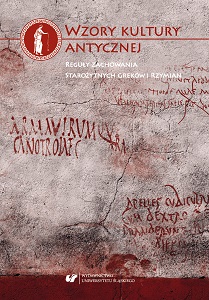Oczy — okna: paradoks ciekawskiego spojrzenia w Plutarcha diatrybie O wścibstwie
Eyes as Windows. The Paradox of the Curious Gaze in Plutarch’s On Curiosity
Author(s): Julia Doroszewska
Subject(s): Language and Literature Studies
Published by: Wydawnictwo Uniwersytetu Śląskiego
Keywords: Plutarch; curiosity; inquisitiveness; eyes; windows; doors; sight; view; extramission theory; intromission theory
Summary/Abstract: The present paper explores the role of sight (opsis) in Plutarch’s treatise On Curiosity (Peri polypragmosynēs). It is argued that the busybody (polypragmōn) is depicted by Plutarch as a spectator (theatēs) who desires to pry into the affairs of others by watching their secrets that are described as the spectacle (theama). Sight and seeing serve as a thematic preoccupation in On Curiosity, and therefore provide a complex cluster of vocabulary and phraseology concerning visual perception; apart from the numerous literal terms (such as the verbs theasthai, blepein, oran and their cognates), one finds there in abundance various suggestive metaphors, comparisons and anecdotes related to these issues, among which a particularly intriguing phenomenon is the figurative use of the house, windows and doors. The latter two play a prominent role as transitional places that lead simultaneously to and from the house interior, and this particular aspect enables comparing them to human eyes which also function as a passage to and from the soul. However, as such windows and doors may be viewed as the weak points of the house, since they are vulnerable to external influences such as someone’s curious gaze. Similarly the eyes are powerful and feeble, active and passive: the viewer, especially the meddlesome one, can penetrate and dominate the view, but the view can also reciprocally captivate the viewer and deprive him of his self-control and will. This paradox of the eye is underpinned by a blend of ancient conceptions of sight, especially by the amalgam of both the so-called extra- and intromission theories. I attempt to show that Plutarch, discussing the vice of meddlesomeness, engages in the ancient philosophical and popular discourse on sight and vision.
Book: Wzory kultury antycznej. Reguły zachowania starożytnych Greków i Rzymian
- Page Range: 163-176
- Page Count: 14
- Publication Year: 2018
- Language: Polish
- Content File-PDF

